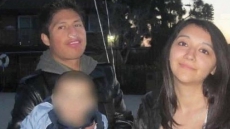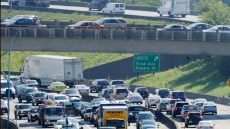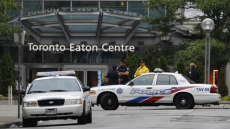OTTAWA — Canadian warplanes conducted a humanitarian escort flight into Iraq, but the military is refusing to say how many were involved, where it took place, when it happened — or who it benefited.
It is just the latest episode in an increasing level of secrecy that's building around the country's combat mission against the Islamic State in Iraq and the Levant.
Col. Dan Constable, the country's task force commander for the Iraq mission, confirmed that CF-18s have conducted no air strikes in the last week, but said the jets did provide cover for another nation's unarmed cargo aircraft, which conducted an airdrop of relief supplies.
He says since another country was involved and there was the possibility the planes might return to the area, details are considered a matter of operational security.
"The presence of our CF-18s to provide top cover for the transport aircraft, allowed it to deliver its aid cargo at a lower altitude knowing that our fighter aircraft could detect and target any air or ground threats," Constable said in a teleconference from an undisclosed air base in Kuwait, where Canada's contingent has been operating.
"The mission was highly effective, and appreciated by our coalition partner."
While the Canadian military was not willing to talk about the mission, the Australian defence department and media reported in detail on Wednesday that one of their C-130J transports delivered 32 tonnes of relief supplies in four drops to beleaguered civilians on Mount Sinjar in northern Iraq. The missions, which provided water, tents and blankets, took place between Nov. 20-23.
National Defence was asked whether those were the missions involving the CF-18s, but it has yet to respond.
The jet fighters have flown a total of 72 combat missions since the beginning of the campaign, four of which have resulted in bombing runs.
The country has a refuelling tanker, servicing Canadian and coalition jets, as well as two CP-140 surveillance aircraft, which are being used to hunt for Islamic State targets on the ground.
Constable says the Aurora spy planes have conducted 23 missions, but would not divulge where they had been flying over the last week — or what coalition air strikes they helped facilitate.
The refusal to discuss the missions follows on Defence Minister Rob Nicholson's repeated denial to release estimates for the ongoing cost of the mission, which is slated to last six months, but could go longer.
The cost "will be reported in the normal way; usually within 90 says of the completion of a mission the costs are tabled," Nicholson told the Commons defence committee on Tuesday.
Military staff, at a weekly briefing in Ottawa, suggested journalists contact the U.S. command overseeing the coalition air campaign against the Islamic State if they wanted more information.





